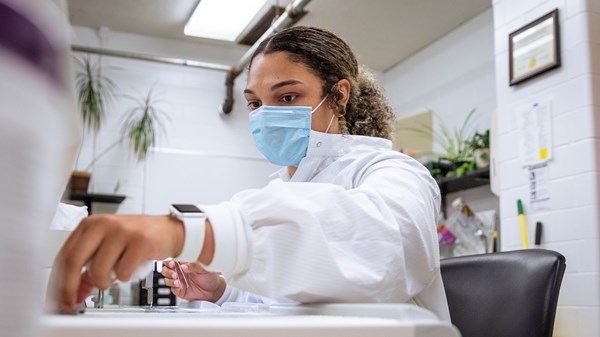
Biomedical Laboratory Diagnostics

Become a disease detective.
Laboratory diagnoses support 70% of medical decisions. Medical laboratory scientists and histotechnologists play a critical role by providing these diagnoses to providers who use them to craft the patient's care plan.
The Biomedical Laboratory Diagnostics program has multiple options for students interested in careers in medical laboratory science or histotechnology. Undergraduate students can pursue either track, while students from varied undergraduate academic backgrounds can pursue a master's in medical laboratory science.
The medical laboratory science and histotechnology programs provide a clear path into an in-demand and growing profession, with career opportunities in diverse clinical laboratory settings. They also prepare students well for further graduate and professional study in the medical or dental professions or the basic sciences.
Get to know us.
Visit. Join us for a campus tour or prospective student day or take a virtual tour of the Health Sciences Center and the STEPS facility.
Apply. Join our community by applying online at apply.wvu.edu.
Who You Are
Finding a treatment for a patient starts with identifying the problem, and laboratory professionals do just that. They serve as a critical part of the care team that gives necessary information to providers who use it to craft the patient's care plan. Biomedical laboratory diagnostics encompasses two types of laboratory professionals: medical laboratory scientists and histotechnologists.
Medical laboratory scientists discover the presence or absence of disease in blood and body fluids and provide data that help healthcare providers determine the best treatment for the patient. They generate critical data for identifying and treating cancer, heart disease, diabetes, and other health conditions.
Histotechnologists are integral to the success of the anatomic pathology department. They perform routine and complex procedures to preserve and process tissue specimens, detect the presence or absence of disease in tissue specimens, and provide data to aid pathologists in determining the diagnosis, prognosis, and best treatment for the patient.
Facts
-
ConnectedStudents enjoy opportunities for real-world clinical experience through affiliations with WVU Medicine and other regional health systems.
-
EstablishedGraduates join a robust alumni community with more than 60 years of graduates since the program's inception.

What You'll Do
Although not often personally involved with patients, medical laboratory scientists and histotechnologists play a crucial, behind-the-scenes role in providing personalized care.
As a laboratory professional, you can expect to find career opportunities in diverse laboratory environments in hospitals and clinics, reference laboratories, and veterinary facilities. You may also find employment in research or forensics laboratories and the pharmaceutical industry - to name a few!
Graduates of our program also frequently pursue graduate and professional study in the medical or dental professions or the basic sciences. In fact, 100% of our graduates find employment or enroll in a graduate program within months of graduation.
Fact
Connect with Us
Stay connected with what's happening at the School of Medicine.
Recent News
Accreditation
The Biomedical Laboratory Diagnostics programs are accredited by the National Accrediting Agency for Clinical Laboratory Sciences (NAACLS).





